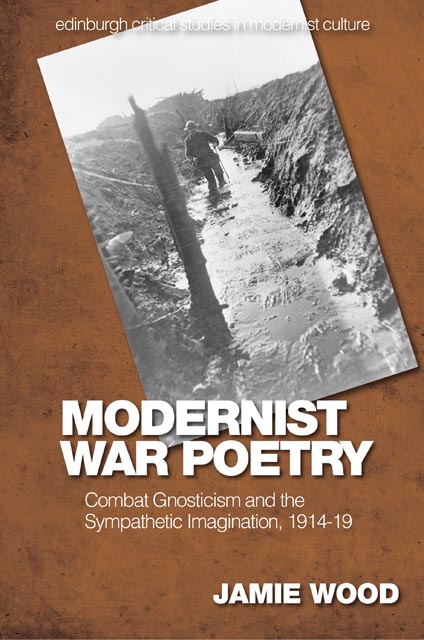Book contents
- Frontmatter
- Contents
- Timelines
- Acknowledgements
- Series Editors’ Preface
- Introduction
- 1 Early Modernist Responses to Combatant Poetry: 1914–Spring 1915
- 2 Reassessing Disaster: 1915
- 3 The Three Lives of Gnosticism: 1916–Summer 1917
- 4 An Emergent Critique of War Experience: Autumn 1917–Spring 1919
- 5 The Form and Practice of Modernist Distaste: Summer–Autumn 1919
- Conclusion
- Bibliography
- Index
- Frontmatter
- Contents
- Timelines
- Acknowledgements
- Series Editors’ Preface
- Introduction
- 1 Early Modernist Responses to Combatant Poetry: 1914–Spring 1915
- 2 Reassessing Disaster: 1915
- 3 The Three Lives of Gnosticism: 1916–Summer 1917
- 4 An Emergent Critique of War Experience: Autumn 1917–Spring 1919
- 5 The Form and Practice of Modernist Distaste: Summer–Autumn 1919
- Conclusion
- Bibliography
- Index
Summary
The Problem with Combat Gnosticism
A recurrent claim in combatant narratives of the First World War is that direct experience of battle, the mud and blood of it all, separated participants from civilians. At its core, the claim is that the phenomenology of trench combat was so profoundly alien that it occupied a realm beyond the abilities of the ordinary imagination. ‘I would that war were what men dream,’ wrote Francis Brett Young in ‘The Pavement’ (1919), ‘A crackling fire, a cleansing flame, / That it might leap the space between / And lap up London and its shame.’ According to this combatant, a discharged medical officer who served in East Africa, the gap between the fronts of battle was so large that only a combatant could walk in another combatant’s shoes. Young graphically illustrates the point in a poem which contrasts the act of pounding London’s pavements with marching into the hell of Passchendaele. One cannot it seems be knee-deep in a traumatising horror such as this: knowledge of the most grotesque aspects of human existence, the intimate and violent realms of the real, would appear to require that we be up to the neck in it all.
As literary scholars, we naturally recoil from these claims. We recognise the specificity of the suffering they document, but we recoil from the suggestion that the projective abilities of the sympathetic apparatus might face a limit. In recent years epistemologies of combat and veterancy such as those of Young have become especially contentious. The notion of a space between fronts, and its consequent valorisation of one side of that space, runs counter to the expansionist impulses within modernist studies. James Campbell has provided us with the most complete rebuttal of such claims. Analysing the war’s principal poetic genre, the trench lyric developed by Wilfred Owen and Siegfried Sassoon amongst others, Campbell gave the combatant’s claims the label ‘combat gnosticism’:
This is what I mean by combat gnosticism: a construction that gives us war experience as a kind of gnosis, a secret knowledge which only an initiated elite knows. Only men (there is, of course, a tacit gender exclusion operating here) who have actively engaged in combat have access to certain experiences that are productive of, perhaps even constitutive of, an arcane knowledge.
- Type
- Chapter
- Information
- Modernist War PoetryCombat Gnosticism and the Sympathetic Imagination, 1914-19, pp. 1 - 23Publisher: Edinburgh University PressPrint publication year: 2022



